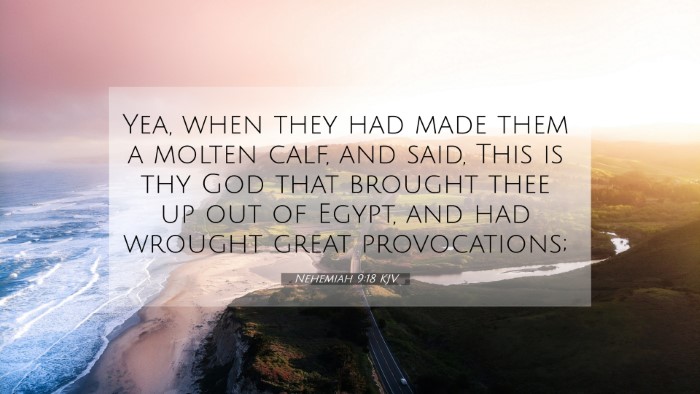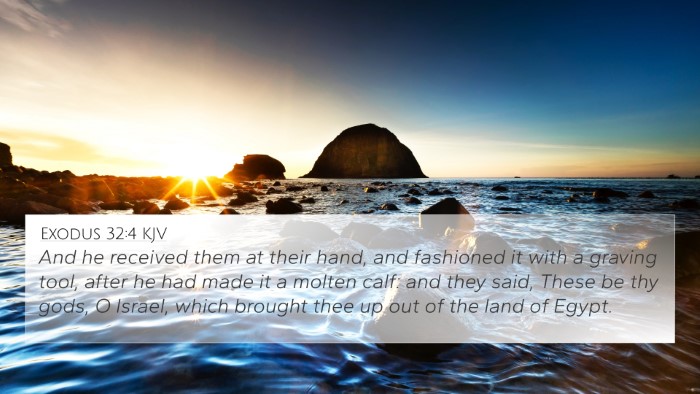Nehemiah 9:18 - Overview
Nehemiah 9:18 recounts a significant moment in Israel's history, highlighting the unfaithfulness of the people despite the mighty acts of God. The verse illustrates God's grace and the persistence of His mercy toward a people who repeatedly turned away from His commandments.
Verse Text: "Yea, when they had made them a molten calf, and said, This is thy God that brought thee up out of Egypt, and had wrought great provocations."
- Context: This verse comes from a prayer by the Levites, recalling the deliverance from Egypt and the subsequent rebellion against God through idolatry.
- Historical Significance: This reflects the sin of making a golden calf during Moses' absence on Mount Sinai, showing the deep-seated inclination towards idolatry.
Commentary Insights
Matthew Henry states that the making of the calf demonstrated the Israelites’ folly and ingratitude. They exchanged the glory of God for a mere idol, showcasing their spiritual blindness. Despite their provocations, God’s mercy remained evident as He continued to lead them.
Albert Barnes highlights that the molten calf represented a profound defection from faith, showing how quickly a nation can forget God. God's patience is underscored, reminding us that rebellion is often met with grace rather than immediate judgment.
Adam Clarke notes that this act of rebellion not only reflects the people's heart but also serves as a warning for future generations. Clarke emphasizes the importance of remembering God's past deliverances, as forgetting them leads to disobedience.
Thematic Connections
- Idolatry vs. Worship: This verse serves as a critical reflection on the dangers of idolatry and the need for true worship. Cross-references can be found in Bible verses: Exodus 32:4-8, Psalm 106:19-21, and Isaiah 40:18-20.
- God’s Forgiveness: Despite the sin of idolatry, God's willingness to forgive is consistently present. This can be cross-referenced with Psalm 103:10-12 and Micah 7:18-19.
- The Nature of Sin: Nehemiah 9:18 can also be connected to Paul’s writings on human sinfulness and the necessity of grace, particularly Romans 3:23 and Ephesians 2:8-9.
Cross-References
- Exodus 32:4-8: The initial account of the golden calf.
- Psalm 106:19-21: A retrospective look at Israel's unfaithfulness.
- Isaiah 40:18-20: God's supremacy over idols.
- Romans 1:21-23: Humanity's tendency to exchange God's glory for created things.
- 1 Corinthians 10:7: A warning against idolatry using Israel's history.
- Hebrews 3:12-13: An admonition against unbelief, echoing the themes in Nehemiah.
- 1 John 5:21: A concise warning against idols for modern believers.
Practical Application
Understanding Nehemiah 9:18 offers essential lessons about human tendencies towards idolatry, the importance of remembering God's works in our lives, and the call to maintain faithfulness to Him.
Conclusion
Nehemiah 9:18 invites believers to reflect on their own faithfulness and the tendency to stray. It acts as a reminder to remain steadfast in worship and carefully consider the implications of idolatry in various forms within our lives today.







